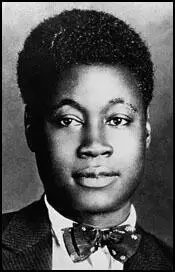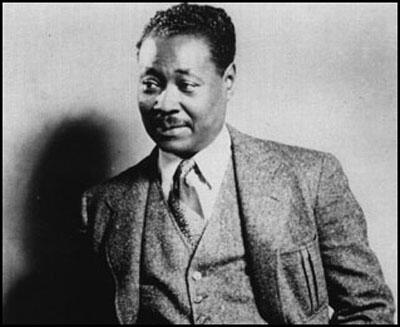Claude McKay

Claude McKay was born in Jamaica on 15th September, 1890. He began writing poetry as a schoolboy. He worked as a policeman in Spanish Town and when he was twenty-two had his first volume of poems, Songs of Jamaica (1912) published.
In 1912 McKay moved to the United States where he attended Tuskegee Institute in Alabama and Kansas State University. He continued to write poetry and in 1918 his work was praised by both Frank Harris and Max Eastman. The following year, his poem, If We Must Die, was published in Eastman's journal, The Liberator.
Frank Harris encouraged McKay to obtain writing experience in England. In 1919 McKay travelled to England where he met George Bernard Shaw who introduced him to influential left-wing figures in journalism. This included Sylvia Pankhurst, who recruited him to write for her trade union journal, Workers' Dreadnought. While in London McKay read the works of Karl Marx and becomes a committed socialist.
In 1921 McKay returned to New York City and became associate editor of The Liberator. Over the next year the journal published articles by McKay such as How Black Sees Green and Red and He Who Gets Slapped. He also published his best known volume of verse, Harlem Shadows (1922).
In 1922 McKay went to Third International in Moscow where he represented the American Workers Party. He stayed in Europe where he wrote Trial by Lynching: Stories About Negro Life in America (1925) and Home to Harlem (1928), a novel about a disillusioned black soldier in the US Army who returns from the Western Front to live in a black ghetto. This was followed by other novels such as Banjo (1928), Gingertown (1932) and Banana Bottom (1933).

McKay gradually lost faith in communism and returned to the United States in 1934. Employment was difficult to find and for a while he worked for the Federal Writers' Project. McKay's published work during this period included his autobiography, A Long Way From Home (1937) and Harlem: Negro Metropolis (1940).
Unable to make a living from writing, McKay found work in a shipbuilding yard. Max Eastman pointed out: "His last years were passed in sickness; he could not write much; and he was destitute. He lived in penury, and watched his fame and popularity gradually disappear from the earth. A few years more and he would have seen them rise again, for his choice was as correct as it was courageous, and his place in the world's literature is unique and is assured." In 1943 he suffered a stroke and the following year was baptized into the Roman Catholic faith. In 1945 his essay, On Becoming a Roman Catholic, was published.
Claude McKay died in Chicago on 22nd May, 1948.
Primary Sources
(1) Max Eastman, Claude McKay (1953)
Claude was born in a little thatched farm house of two rooms in the hilly middle country of Jamaica in the West Indies. He learned in childhood how a family of his ancestors, brought over in chains from Madagascar, had kept together by declaring a death strike on the auction block. Each would kill himself, they vowed solemnly, if they were sold to separate owners. With the blood of such rebels in his veins, and their memory to stir it, Claude McKay grew up proud of his race and with no disposition to apologize for his colour.
(2) Claude McKay, A Long Way From Home (1937)
The Masses was one of the magazines which attracted me when I came to New York in 1914. I liked its slogans, its make-up, and above all, its cartoons. There was a difference, a freshness in its social information. And I felt a special interest in its sympathetic and iconoclastic items about the Negro.
Some times the magazine repelled me. There was one issue particularly which carried a powerful bloody brutal drawing by Robert Minor. The drawing was of Negroes tortured on crosses deep down in Georgia. I bought the magazine and tore the cover off, but it haunted me for a long time. There were other drawings of Negroes by an artist named Stuart Davis. I thought they were the most superbly sympathetic drawings of Negroes done by an American. And to me they have never been surpassed.
(3) Claude McKay met Max Eastman for the first time in 1918
The rendezvous with Max Eastman was to be at his study-room, somewhere in or near St. Luke's Place. I got there first and was about to ring when my attention was arrested by a tall figure approaching with long strides and distinguished by a flaming orange necktie, a mop of white hair and a grayish-brown suit. The figure looked just as I had imagined the composite personality of The Masses and The Liberator might be: colourful, easy of motion, clothes hanging a little loosely or carelessly, but good stuff with an unstylish elegance. As I thought, it was Max Eastman.
We went up into a high room and he lounged lazily on a couch and discussed my poems. I had brought a batch of new ones. There was nothing of the "I" first person in Max Eastman's manner. Nor did he question me to any extent about myself, my antecedents, and the conditions under which I lived and wrote at the time. He was the pure intellectual in his conversation and critical opinion.
(4) In 1918 The Liberator decided to publish Claude McKay's poem, If We Must Die. McKay pointed out in his autobiography, A Long Way From Home (1937).
The Liberator was a group magazine. The list of contributing editors was almost as exciting to read as the contributions themselves. There was a freeness and a bright new beauty in those contributions, pictorial and literary, that thrilled. And altogether, in their entirety, they were implicit of a penetrating social criticism which did not in the least overshadow their novel and sheer artistry. I rejoiced in the thought of the honour of appearing among the group.
(5) Claude McKay, If We Must Die (1918)
If we must die, let it not be like hogs
Hunted and penned in an inglorious spot,
While round us bark the mad and hungry dogs,
Making their mock at our accursed lot.
If we must die, O let us nobly die,
So that our precious blood may not be shed
In vain; then even the monsters we defy
Shall be constrained to honor us though dead!
O kinsmen! we must meet the common foe!
Though far outnumbered let us show us brave,
And for their thousand blows deal one deathblow!
What though before us lies the open grave?
Like men well face the murderous, cowardly pack
Pressed to the wall, dying, but fighting back!
(6) In 1920 Claude McKay travelled to England where he met George Bernard Shaw.
I forwarded Frank Harris's letter of introduction to Shaw. Soon I received a reply inviting me to his house. Shaw was acquainted with the old Masses and also The Liberator, in which my poems had been featured. Anything he had to say on any subject would be interesting to me, as it would be to thousands of his admirers everywhere. For Shaw was a world oracle. And the world then was a vast theatre full of dramatic events.
Shaw received me one evening alone in his house in Adelphi Terrace. There was an elegance about his reedlike black-clothed figure that I had not anticipated, nor had I expected such a colourfully young face and complexion against the white hair and beard.
(7) In 1920 Claude McKay found work with the Workers' Dreadnought, a newspaper edited by Sylvia Pankhurst.
Sylvia Pankhurst wrote asking me to call at her printing office in Fleet Street. I found a plain little Queen Victoria sized woman with plenty of long unruly bronze-like hair. There was no distinction about her clothes, and on the whole she was very undistinguished. But her eyes were fiery, even a little fanatic, with a glint of shrewdness.
She said she wanted me to do some work for the Workers' Dreadnought. Perhaps I could dig up something along the London docks from the coloured as well as the white seaman and write from a point of view which would be fresh and different. Also I was assigned to read the foreign newspapers from America, India, Australia, and other parts of the British Empire, and mark the items which might interest Dreadnought readers.
(8) Claude McKay, The Lynching (1920)
His Spirit in smoke ascended to high heaven.
His father, by the cruelest way of pain,
Had bidden him to his bosom once again;
The awful sin remained still unforgiven.
All night a bright and solitary star
(Perchance the one that ever guided him,
Yet gave him up at last to Fate's wild whim)
Hung pitifully o'er the swinging char.
Day dawned, and soon the mixed crowds came to view
The ghastly body swaying in the sun.
The women thronged to look, but never a one
Showed sorrow in her eyes of steely blue.
And little lads, lynchers that were to be,
Danced round the dreadful thing in fiendish glee.
(9) Max Eastman, Claude McKay (1953)
His last years were passed in sickness; he could not write much; and he was destitute. He lived in penury, and watched his fame and popularity gradually disappear from the earth. A few years more and he would have seen them rise again, for his choice was as correct as it was courageous, and his place in the world's literature is unique and is assured.

